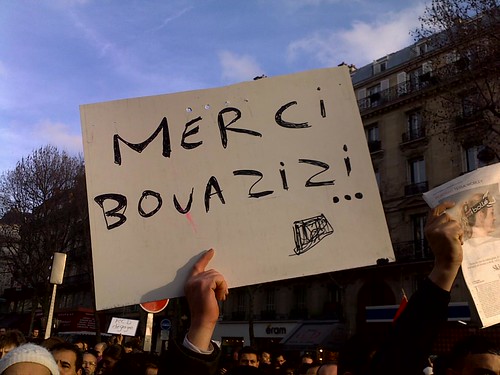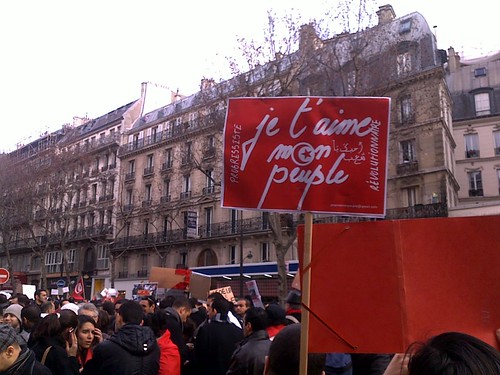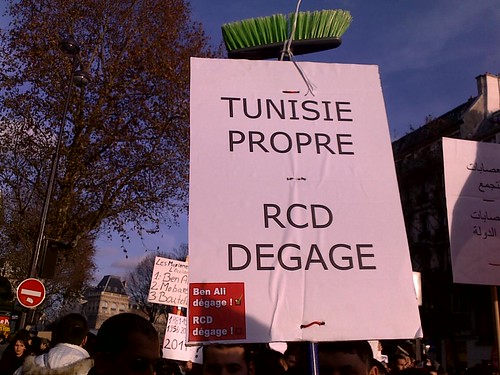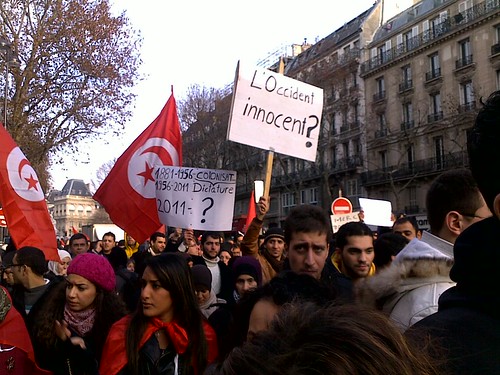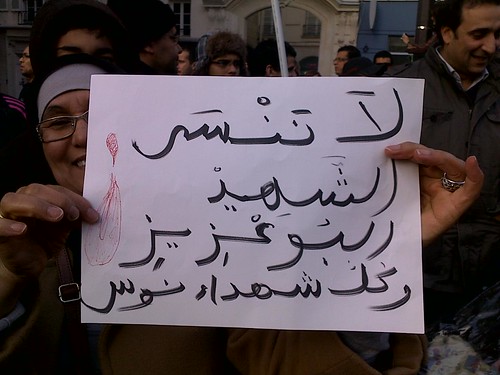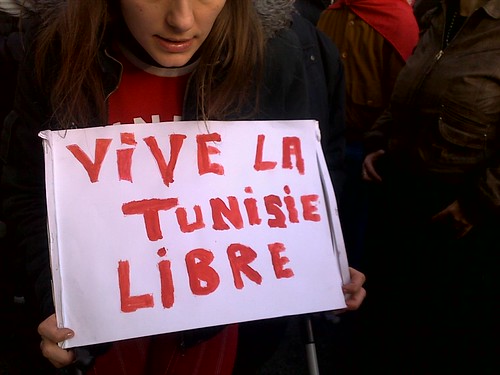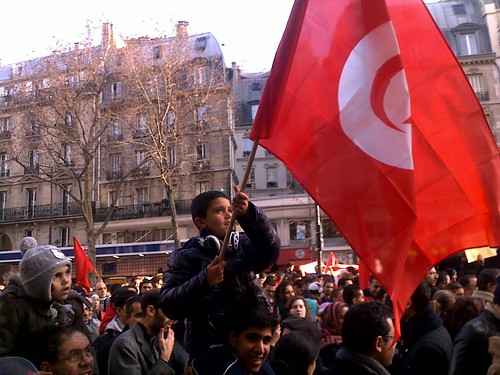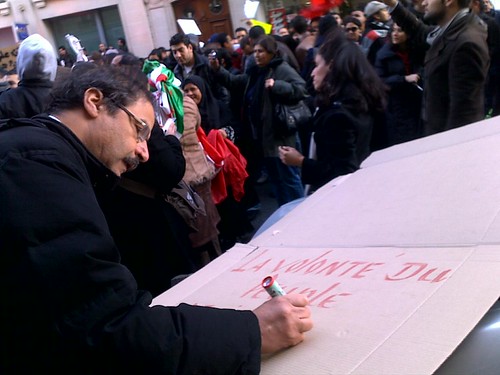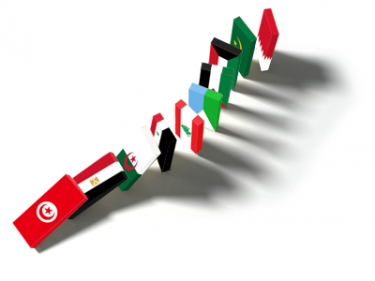France:
A Show of
Tunisian Pride in Paris
After weeks of popular upraising, and a dramatic 24 hours when in rapid succession, ex president Ben Ali fled Tunisia to seek asylum in Saudi Arabia, his prime minister took power, only to be replaced a few hours later by the head of Tunisian Parliament, and with elections now planned to take place in two month, the 600,000-strong Tunisian diaspora living in France gathered today, saturday 15th, in the streets. Despite their concern for the continuous violence in Tunisia, their relatives and the future, they granted themselves one day to rejoice, celebrate and share an overwhelming collective emotion. Here are a few pictures* of the “day after”, a Tunisian Pride in Paris.
"Thank you, (Mohamed) Bouazizi !" Hommage to the fruit seller in Sidi Bouzid who sacrificed his life
"I love you, my people"
A clean Tunisia - Shove off, RCD (Ben Ali's parti)
Questions: "Is the West innocent?" "1881-1956: colonisation 1956- 2011: dictatorship 2011-…: ?
"Don't forget the martyr Boazizi and all the Tunisian martyrs"
Long live free Tunisia
January 15th, 2011: a day to remember for ever
A last-minute poster, where a Tunisian demonstrator writes: “The will of the People”Many Tunisian and French readers will save today's issue of the French daily “Libération” that says it all, with one word, in French and Arabic: Freedom.

In the deluge of comments and tweets congratulating the Tunisians, one message to all Tunisians, from Adrien94, on France 24 website:
Merci pour cette leçon, peuple tunisien
Vous nous avez monté ce qu'est le courage.
Vous nous avez montré qu'on peut se battre pour une idée même quand tout semble verrouillé par un groupe.
Et vous ne l'avez pas fait au nom d'un dieu ou d'un autre futur despote. vous l'avez fait parce que c'était JUSTE.A l'heure où la coupe du monde devient le seul moyen de faire vibrer mon peuple, vous nous rappeler le vrai sens des choses.
Je vous souhaite d'éviter les périodes sombres qui suivent parfoir les révolutions.
Mais je crois en vous, car votre révolution est exemplaire!Vive la Tunisie et vive la démocratie
Thank you for this lesson, Tunisian people
You showed us what courage means. You showed us that we can fight for an idea, even when everything looks locked up by a group.And you did not do it in the name of a god or another future despot. You did it for JUSTICE.
In a time when the World Cup is the only way to make my (French) people vibrate, you remind us of the true meaning of things.
I hope you will avoid the dark times that sometimes follow revolutions. And I believe in you, because your revolution sets an example.
Long live Tunisia and long live democracy* The photos were all originally taken by the author of the post.
Protests spread across
North Africa

As Tunisia struggles with its new political reality, protests have kicked off in Algeria, Libya, Egypt and Jordan. The protests stem from a multiplicity of root causes, but seem to be populated by a public emboldened by what they saw unfolding in Tunisia. Like Tunisia, the protests are being promoted and discussed using social media.
There has been deep unrest in Egypt since the bombing of a Christian Coptic church on New Year’s Eve. Protests from the Christian community, bolstered by many Muslims, petered out but have now returned after recent events in Tunisia. The video below, titled “Today Tunisia, Tomorrow Egypt! Down with Mubarak!”, was taken at a protest by opponents of the Mubarak government at the Press Syndicate in Cairo. The video was posted by Egyptian activist Gigi Ibrahim. She tweeted this message: @Gsquare86 Video: Protest in celebration of free #Tunisia turns into a bash of #NDP & #Mubarak ..Down with all dictators http://bit.ly/e7y5VN #Egypt
Jordanians gather to demand reform
I have a feeling that great things are in store for Jordan, we must focus#ReformJO
Wow, leading Islamist tells crowd of protestors in #Jordan that the problem is King himself? http://bit.ly/f5919S #reformJO
On his Black Iris blog, Naseem Tarawnah argues that the protests in Tunisia will not be mirrored to the same extent in Jordan.
Will the events in Tunisia cause a similar situation to unfold in Jordan?
Probably not. While parallels, such as those mentioned above, can be easily drawn throughout much of the Arab world where the majority of the population is struggling to make ends meet, the paradigm is quite different. Both the economic, political and social situations are completely different when it comes to these two countries. Jordanians will likely be inspired enough by Tunisia to engage in the vocalization of their financial despair, even to the extent of calling on the typical toppling of the Rifai government (or whatever government is in play). But they will, for the most part, avoid widespread violence, or calls for a complete overhaul of the system.
Libya reacts to Qaddafi's Tunisia statement
In the aftermath of the Tunisian uprising, Libyan leader Muammar Gaddafi criticised the fast pace at which change was implemented in the neighbouring country. Gaddafi, an ally of the Tunisian president, also condemned the role of Wikileaks in the protests. Wikileaks recently released cables indicating possible corruption in Tunisia. But videos are being uploaded to YouTube which show unrest on the streets.
News flying around about protests in Libya. Not just in one place, but seemingly in several towns and cities.. #LIBYA #Sidibouzid
#Libya I am working on confirming news of protests and clashes, apparently in 2 cities at least but some talk of even more #sidibouzid
Algerian protests begin with self-immolation
A very grim video on YouTube shows the aftermath for one protester in Algeria who set himself on fire, in what may have been a deliberate echoing of the action taken by Tunisian Mohamed Bouazizi. Due to the graphic nature of the video, we have decided not to publish it here, but it is available at this link.
Saturday, January 15th, 2011

By Mona Eltahawy
Washington Post, Saturday, January 15, 2011
For 23 years, Zine el-Abidine Ben Ali presided over the most tightly run ship in the Arab world. So perfect a police state was his Tunisia, with its ubiquitous informers and portraits of the president, that no one predicted Ben Ali’s ship could capsize.
But capsize it did Friday, after a 29-day popular uprising against unemployment, police brutality and the regime’s corruption. It was the worst unrest since Ben Ali took over.
Not once in my 43 years have I thought that I’d see an Arab leader toppled by his people. It is nothing short of poetic justice that it was neither Islamists nor invasion-in-the-name-of-democracy that sent the waters rushing onto Ben Ali’s ship but, rather, the youth of his country.
Their rage at political and economic disenfranchisement spilled over last month with the desperate act of an unemployed man. Mohammed Bouazizi, 26, distraught when police confiscated his unlicensed produce stand, set himself on fire on Dec. 17 and died on Jan. 3. Soon, several other unemployed youth tried to commit suicide, and at least one of them did. Is there a more poignant portrayal of what ails the Arab world than images of its young people killing themselves as their leaders get older and richer?
Human rights groups say more than 60 people have died in clashes with Ben Ali’s security forces since Dec. 17, but Bouazizi’s self-immolation has come to symbolize what many are calling the Jasmine Revolution.
Tunisia is a typical Middle East country in that its population is composed largely of young people. Half the population is under 25 years of age and so have known no leader other than Ben Ali, who was only Tunisia’s second president since it gained independence from France in 1956.
For decades, a host of Arab dictators have justified their endless terms in office by pointing to Islamists waiting in the wings. Having both inflated the egos and power of Islamists and scared Western allies into accepting stability over democracy, those leaders were left to comfortably sweep "elections." Ben Ali was elected to a fifth term with 89.62 percent of the vote in 2009.
All around him is a depressingly familiar pattern. Libyan leader Moammar Gaddafi (68 years old) has been in power since 1969; Yemen’s Ali Abdullah Saleh (64) has ruled since 1978 and Egyptian President Hosni Mubarak (82) since 1981. Algeria’s Abdelaziz Bouteflika (73) is a relative newcomer, having been in power only since 1999. Not so much fathers as grandfathers of their nations, these autocrats cling to office – and are increasingly out of touch with their young populaces.
No doubt, every Arab leader has watched Tunisia’s revolt in fear while citizens across the Arab world watch in solidarity, elated at that rarity: open revolution.
"Goosebumps all over. I can’t believe I lived through an Arab revolution!! Thank you, Tunisia!" tweeted Gigi Ibrahim, a young Egyptian woman whose handle is Gsquare86. "The power of the masses is capable of toppling any dictatorship. Today was Tunisia. Tomorrow is Egypt, Jordan. LONG LIVE REVOLUTION!"
Social media, where young Arabs organize and speak out against their respective regimes, have given the world a clear view of the thoughts, hopes and videos of Tunisians. For days, I have been glued to Twitter, on which events in Tunisia are discussed much faster than mainstream media could report them.
"Tunis now: the chants continue ‘No to Ben Ali even if we die,’ " tweeted a Tunisian who joined the 6,000 to 7,000 protesting outside the Interior Ministry hours before Ben Ali fled.
Tunisia is not a major U.S. ally. On Jan. 7, the State Department said it was concerned about the regime’s online and real-life crackdown. Secretary of State Hillary Clinton said on Jan. 12 that Washington would not take sides, infuriating those who saw a double standard in the vocal U.S. position on Iran.
But others saw encouragement from Washington’s reticence. U.S. leaders are "supporting us with their silence," a Tunisian told me on Twitter. "If they say anything, we will lose."
As Arabs everywhere marvel, those in Tunis still seem grounded. Even as Prime Minister Mohammed Ghannoushi announced on state television Friday that he had taken over, people noted online that the acting president was part of Ben Ali’s despised inner circle. Surely Ghannoushi is aware that Tunisians who have faced down live ammunition, curfews and tanks on the street the past month have little appetite for more of the same leadership.
Indeed, one Tunisian tweeted me: "What is unfolding is another dictatorship, we must continue the battle!"
Tunisians were fed up with not just Ben Ali but the "quasi mafia" surrounding him, as the family and cronies were described in a WikiLeaks cable, because of their "organized corruption." President Obama issued a statement on Friday in support of the Tunisian people and calling for free and fair elections.
Ben Ali imprisoned or chased into exile viable alternatives to his rule, so what comes next politically is not clear. But the world is watching this small Arab country and wondering if this is the first step in ridding the region of its granddaddies.
===========
Mona Eltahawy is an award-winning columnist and an international public speaker on Arab and Muslim issues. She is based in New York.
She is a columnist for Qatar’s Al Arab newspaper, Israel’s The Jerusalem Report, Denmark’s Politiken and Metro Canada. Her opinion pieces have been published frequently in The Washington Post and the International Herald Tribune and she has appeared as a guest analyst in several media outlets.
__________________________
Arab World: After Tunisia,
Who's Next?
| Countries | Tunisia, Saudi Arabia, Egypt, Syria |
| Topics | Freedom of Speech, Cyber-Activism, Diaspora, Elections,Governance, Human Rights, Protest, Youth, International Relations, Politics |
| Languages | Arabic, English |
 This post also available in:
This post also available in:
| Français | · Monde arabe : Après la Tunisie, à qui le tour ? |
| Malagasy | · Tontolo Arabo: Aorian'i Tonizia, iza ny manaraka? |
| polski | · Świat arabski: Kto następny po Tunezji? |
Following the events in Tunisia that forced former president Zine El Abidine Ben Ali to flee the country, netizens across the Arab world are asking: “are we next?”
Egyptian journalist and blogger Mona Eltahawy, who has kept close watch on the Twittersphere throughout the Tunisian uprising, penned a widely-read column this morning entitled “More Tunisias, Please” in which she noted that the Arab world is watching with bated breath to see if “another Tunisia” will occur:
Ben Ali imprisoned or chased into exile viable alternatives to his rule, so what comes next politically is not clear. But the world is watching this small Arab country and wondering if this is the first step in ridding the region of its granddaddies.
Analyst Juan Cole also suggested the potential for Tunisia to be the start of something bigger:
…But since Tunisia is Sunni and Arab, it would not be embarrassing for Egyptians, Algerians, Syrians and Jordanians to borrow its techniques and rhetoric for their own domestic purposes, which makes it potentially influential. Certainly an alliance of frustrated BA holders, professionals, workers, farmers, progressives and Muslim activists that results in a parliamentary democracy would likely have more resonances in the Arab world than Iran’s authoritarian rule by ayatollah (Sunnis don’t have ayatollahs). It remains to be seen if little Tunisia is the start of something, or one more false dawn.
All day, similar sentiment has echoed across Twitter and the Arab blogosphere. Saudi journalist Ebtihal Mubarak (@EbtihalMubarak) tweets:
If the unexpected kept on happening next to Tunisian revolution is not Egypt but SYRIA. Now that will be a New Arab world#Sidibouzid #Syria
“Majnoon Habibi” (@majnoon4) writes, along the same lines:
Tunisia today, fascist Syria tomorrow. The revolution is coming. Bring democracy to the Arab Middle East.
Syrian Arwa Abdulaziz (@arwa_abdulaziz) alsopredicts that Syria will be the next to fall:
Syrian Yassine Essouaiha (@syriangavroche) feels similarly:
Despite the hopes, however, Nader Haddad (@NaderHaddad) notes that the Syrian state news agency has not made mention of the popular revolt in Tunisia:
No mention whatsoever of the popular revolution in #Tunisia by the Official news agency of #Syria. http://bit.ly/g4xNY8
What will happen next remains to be seen, but it is undeniable that the Tunisian uprising has sparked hope for tides of change across the Arab world.

